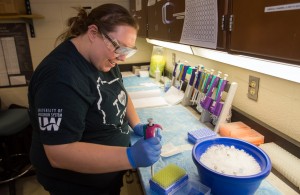
Erin Geddes, a UW-Platteville senior, will present her research on April 13 in the Capitol Rotunda in Madison, Wis.
PLATTEVILLE, Wis – A group of University of Wisconsin-Platteville students are collaborating on a research project that examines Staphylococcal enterotoxin B, a toxin responsible for staphylococcal food poisoning in humans. Erin Geddes, senior chemistry criminalistics major from Osceola, Wisconsin, will present the research on Wednesday, April 13, at the Posters in the Rotunda event at the capitol in Madison, Wisconsin.
“SEB causes cells to spontaneously undergo cell death, or apoptosis,” said Geddes. “The purpose of our research is to understand the pathways this toxin may take to reach apoptosis and to see if an inhibitor successfully reduces apoptosis.”
An infection from the toxin, in low doses, results in common food poisoning symptoms such as nausea and fever. However, in high doses, infection can have even more serious effects. “It can cause toxic shock within the body or even death,” said Geddes. “If we can find an inhibitor to stop it from killing the cells within the body, we can stop the discomfort of food poisoning.”
The toxin is resistant to antibiotics, so the students are looking at a C-Jun N-Terminal Kinase-specific inhibitor to stop cell death from occurring.
To do this, the students used a reverse transcription polymerase chain reaction to convert RNA into cDNA, which is a copy of the DNA. Then, they used a polymerase chain reaction, a technology used to amplify a single copy of cDNA, so it is easier to look at specific regions of the DNA. After that step was completed, students used agarose gel electrophoresis to identify the gene of interest using fluorescence. By comparing the different samples with the proper controls, the students analyzed the intensity of the fluorescence to understand how well the inhibitor is working. “If there is an increase in fluorescence, then the gene is highly expressed similar to the effect of SEB. With less fluorescence, it means the inhibitor is effectively inhibiting cell death,” explained Geddes. Finally, to verify the gene expression results, students conducted enzyme-linked immunosorbent assays, a test to identify specific protein expression.
“Our research project is unique because we are looking at DNA in blood cells and how it interacts with a toxin that causes something as basic as food poisoning. It’s interesting how much our DNA actually has an impact in our bodies, rather than just being genetic material,” said Geddes. “I’ve always loved working with DNA and learning about what we can do with it.”
Dr. Chanaka Mendis, assistant dean for faculty/staff services in the College of Engineering, Mathematics and Science, and professor of chemistry, is the advisor of the research project. “I talked to Dr. Chanaka Mendis about joining his research team since I knew he worked with DNA,” she said. “And I loved it so much that I continued doing research even after I finished my required credit hours for my major.”
“Not only do I get to work on a project that has real significance in our society, but I also am allowed to work with professors who have time to work on the project with me and are willing to help with any questions. At UW-Platteville, the best of both worlds is seen. I get to have the research experience of a big time college with the feel of a small school.” –Erin Geddes
Geddes is excited to attend the Posters in the Rotunda event. “I love being able to talk to others in my field who are interested in what we do on campus,” she said. “I feel a real sense of accomplishment when I see how our research has progressed. Not only do I get to work on a project that has real significance in our society, but I also am allowed to work with professors who have time to work on the project with me and are willing to help with any questions. At UW-Platteville, the best of both worlds is seen. I get to have the research experience of a big time college with the feel of a small school.”
Other students involved in the research project included: Danielle Burton, senior chemistry major from Caledonia, Wisconsin; Dylan Borgos, senior biochemistry major from Eagan, Minnesota; Connor Doyle, junior chemistry major from Lodi, Wisconsin; and Michelle Hendricks, junior biochemistry major from Green Bay, Wisconsin.
Looking forward, the project will need to be continued with further research. However, once an inhibitor is identified that can block the apoptotic relating to this certain toxin, it could assist many investigations focused on cell death and aging.
Written by: Laura Janisch, University Information and Communications, 608-342-1194, janischla@uwplatt.edu
